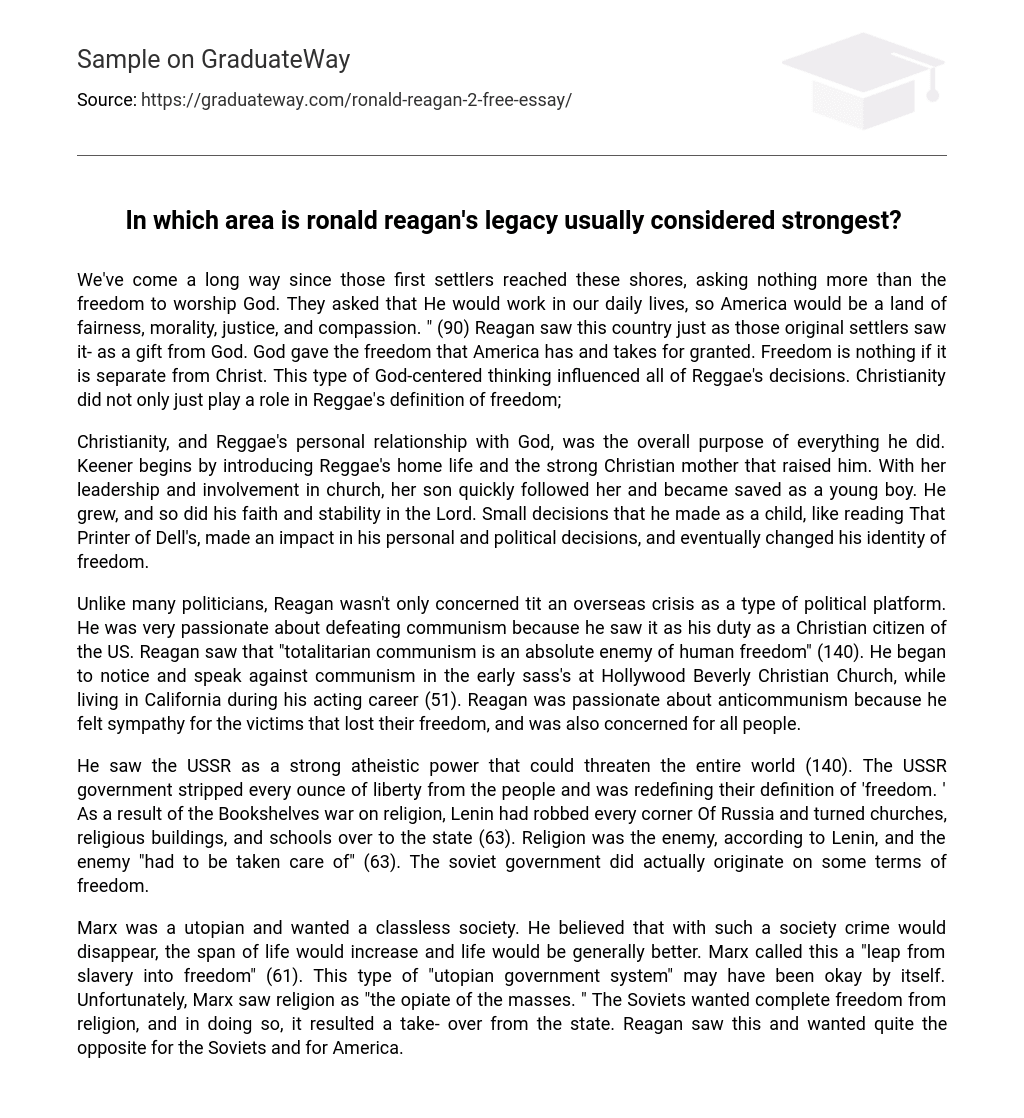Since the first settlers arrived on these shores, their main desire was the freedom to worship God. They also prayed for God’s presence in their daily lives, in order for America to be a land characterized by fairness, morality, justice, and compassion (90). President Reagan shared the same perspective, considering America as a divine gift just like the early settlers did. He recognized that the freedom enjoyed in America is a result of God’s blessing, and without Him, it would be meaningless. This God-centered mindset guided all of Reagan’s decisions, and Christianity played a significant role in shaping his understanding of freedom.
The central focus of everything Reggae pursued in life was Christianity and his personal connection with God. The introduction by Keener sheds light on Reggae’s upbringing and the influential role played by his devoted Christian mother. Under her guidance and active involvement in the church, Reggae followed suit and embraced salvation as a young boy. As he matured, his faith in the Lord grew stronger, providing him with stability. Even simple choices made during his childhood, such as reading That Printer of Dell’s, influenced his personal and political decision-making, ultimately altering his identity to one of liberation.
Reagan had a different approach from many politicians. He wasn’t only focused on using overseas crises as a political platform. As a Christian citizen of the US, he felt a strong duty to defeat communism. According to Reagan, “totalitarian communism is an absolute enemy of human freedom” (140). Even during his acting career in California, he started speaking out against communism at Hollywood Beverly Christian Church in the early 1900s (51). Reagan’s passion against communism stemmed from his empathy for the victims who lost their freedom and his concern for all people.
He viewed the USSR as a formidable atheist force that posed a potential threat to the global community (140). The government of the USSR forcefully eliminated all forms of liberty enjoyed by its citizens and redefined their concept of ‘freedom’. Due to the anti-religion campaign initiated by Bookshelves, Lenin confiscated properties across Russia, converting churches, religious structures, and educational institutions into state-owned entities (63). Religion was deemed an adversary by Lenin, and he deemed it necessary to suppress it (63). The Soviet government did, to some extent, establish certain aspects of freedom.
Marx, a utopian, aspired for a classless society in which crime would vanish, life expectancy would rise, and overall quality of life would improve. He referred to this as a “leap from slavery into freedom” (61). While this “utopian government system” may have had its merits, Marx viewed religion as “the opiate of the masses.” The Soviets sought total liberation from religion, leading to state dominance. Ronald Reagan, however, observed this and desired the complete opposite for both the Soviets and America.
In his perspective, the war was merely a long-standing disagreement. It represented a conflict between individuals who value and respect the right of every human being to determine their own fate, and those who do not share this conviction. Furthermore, he asserted that the primary contrast between these two nations, which held contrasting ideologies, lay in the distinction between supporters of personal liberty and advocates for state dominance (104). Reagan argued that genuine freedom could only be achieved through a relationship with Christ and emphasized its essentiality for the soul.
His definition of freedom, centered around his love for Christ, was that a nation forced to be atheist could never truly have this freedom. He believed that Jesus Christ was the ultimate source of freedom and saw these two topics as inseparable. According to him, freedom was an inalienable right bestowed by God (102). Reagan sought divine freedom from God not only in the battle against communism, but also in the context of America. He criticized the US government for involving itself in more than it should. In his view, as the government took more money from citizens, it also stripped away their individual freedom.





